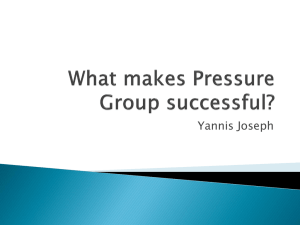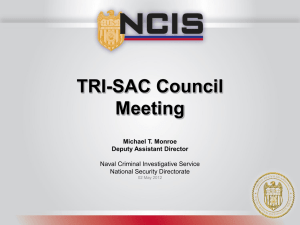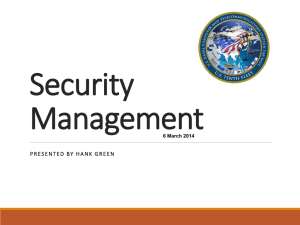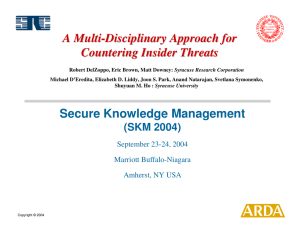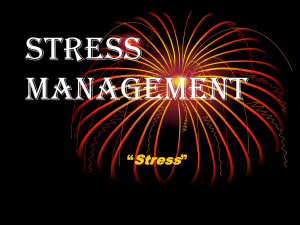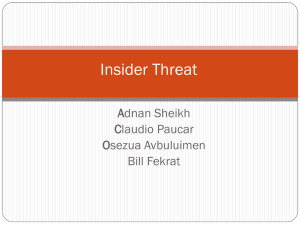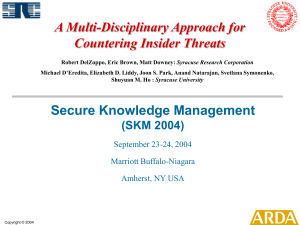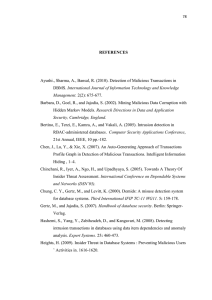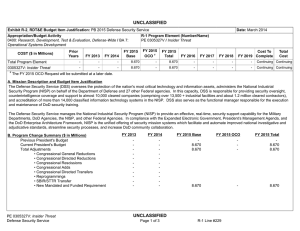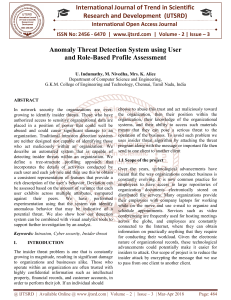The Threat
advertisement
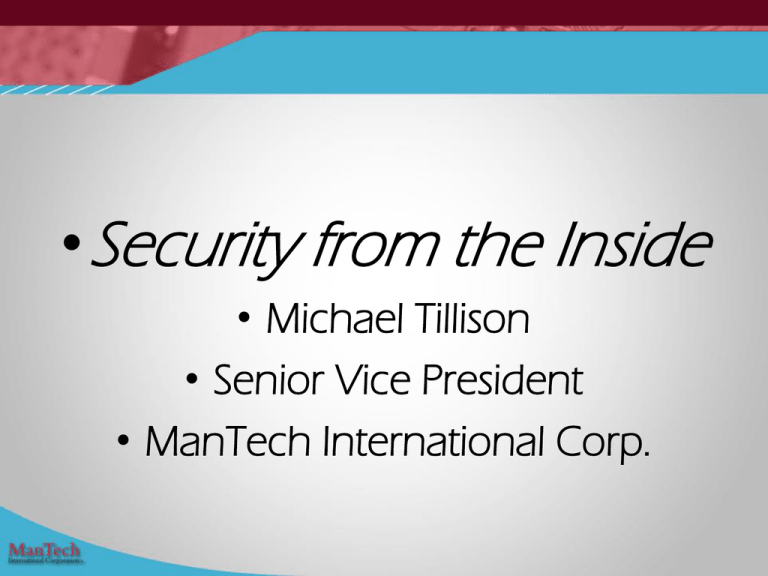
• Security from the Inside • Michael Tillison • Senior Vice President • ManTech International Corp. The Threat - People • Company insiders, employees, contractors, vendors, etc…consitute the greatest risk: • Risky Internet Behavior • Unsolicited email attachments • Divulge proprietary information • Introduce wireless risks to corp. networks • Neglect security in their daily activities • Intentional and unintentional activities that put sensitive company information at risk. The Threat - People • 85% of companies and Govt. Agencies have experienced breaches ($59 Billion per yr.) (NSI) • 75% of security breaches are insiders (NCIX) • 59% of employees leaving a company admit to taking proprietary information with them (FBI) • Industry SCRs up 600% since 2009 (DSS) • 800 insider threat cases-majority of subjects took the information within the last 30 days of employment (CERT; Carnegie Mellon) The Threat - People • Security attacks increasing with the economic downturn – • Data breaches increased 50% in past 2 yrs (ITRC) • 2013 – Insiders incidents have overtaken computer viruses as the most frequent reported type of security incident. Employee Behavior doesn’t have to be Malicious to be dangerous • Common gateways to hacker attacks, information theft, viruses and other incidents: Carelessness with passwords Opening unexpected email attachments Ignorance about wireless/mobile devices risk Naiveté’ towards social engineers contact and questions – Laptop loss due to theft or carelessness – Cavalier attitude towards security policy and procedures – – – – Unintentional Insider Solution – Education/Awareness Program • Employee understands the value of company’s information assets and the consequences if compromised. • Security perceived as synonymous with market capitalization, full employment, revenue growth, increased profits and market expansion – • Employees accept responsibility as owners of the enterprise • Education/Training raises employee awareness and provides critical knowledge and skills to counter the growing threat. ROI • Hacker and virus damage short-term and long-term costs to companies - $1.6 Trillion • Liability exposure with e-commerce, partnering and other third-party relationships. • Reduced liability insurance premiums • Strong security culture may defend against disgruntled employee sabotage/Workplace Violence, etc… Malicious Insider Threat – “We have met the enemy and he is us” • • • • Bradley Manning Bryan Underwood Edward Snowden Others ----- Government Response • Executive Order 13587 – Structural Reforms to improve Security of Classified Networks • Executive Order 13556 – Controlled Unclassified Information • DFARS – Unclassified IT Security • Insider Threat Task Force – DNI • Insider Threat Policy/Standards • NISPOM conforming change requiring Insider Threat Program • Contract Requirements Holistic vs. Cyber Approach • Cyber (SOC) – Detects data access and policy infractions – Reactive or post intrusion forensics – Difficult to discern between malicious vs. user error or training issues – Smaller number of data sources • Holistic – – – – – Proactive identification of high risk threats before the event. Facilitates more accurate targeting Facilitates removing vulnerabilities before exploitation Enables enhanced awareness training Able to tailor the tools and program to fit the business model Insider Threat Program • • • • • • • Policy-Program Development Communications High Risk Employee List Enhanced Monitoring Investigations Case Escalation Reporting Preconditions for Insider Betrayal • The same conditions apply for other insider crimes: embezzlement, sabotage and procurement fraud. – An opportunity to commit the crime – A motive or need to be satisfied through the crime – An ability to overcome natural inhibitions to criminal behavior. (moral values, loyalty, fear) – A trigger that sets the betrayal in motion Risk Indicators • • • • • • Personal Indicators Loyalty Indicators Technology Indicators Performance Indicators Foreign Influence Indicators Security Indicators My Major Concern • The individual who can preserve a calm outward demeanor while their private life descends into a pit! • They never present themselves for help knowing that their careers would be over. • Self-interest and talent – smart enough to prevent incriminating matters from becoming public. (Usual security checks are not effective) The Future • Better profiling and detection tools • Promote conditions that reduce the motivation to engage in insider activity before there is anything to detect. • Build mechanisms that create safe exits for troubled insiders before they engage in malicious activity. • Termination procedures that protect the company. Corporate Teamwork • • • • • • • Security IS Human Resources Compliance Legal Risk Executive Management • Questions??????
